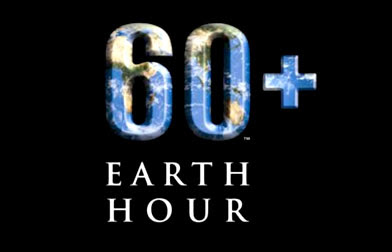>
Now in its fourth year in the Philippines, Earth Hour again aims to engulf the entire country – from Batanes to Tawi-Tawi – in darkness. The hour-long event, which was birthed in Australia in 2007 and embraced by the Philippines in 2008, was created to empower people to address climate change via a 60-minute switch-off. Earth Hour 2011 differs from all previous observances by focusing on what citizens can do beyond the switch-off.
“Earth Hour is a simple act that emphasizes both the ease and importance of adopting energy-efficient practices and lifestyles,” says Earth Hour National Director Atty. Gia Ibay, who also leads the World Wide Fund for Nature (WWF-Philippines) Climate Unit. “Given ever-increasing energy demands, we must be mindful of the need to control human-induced global warming by adopting smarter and more responsible energy practices.”
The Philippines topped global Earth Hour participation levels for both 2009 and 2010. Ten million Filipinos in 647 towns, cities and municipalities switched off in 2009, while 15 million Filipinos in 1076 towns and cities joined the 2010 switch-off. Over a billion people from 128 countries participated in Earth Hour 2010 – marking it as the largest environmental event in known human history.
“Though it would be wonderful to again be number one in terms of participation, we must emphasize that Earth Hour is but 60 minutes long. If we want lasting and effective results, then we must inculcate the true spirit of the event into our lives – which is to reduce our consumption of power, water and other critical resources. We want Filipinos to pledge to a year-long commitment to reduce their energy usage,” notes Ibay. “Pledges can take the form of biking to work, choosing to fly less, planting native trees, going on a no-meat diet and so on. It all depends on what the individual is willing to do. In the same fashion, corporations and communities can make commitments to be more resource efficient and environmentally responsive. Remember, it starts with nothing more than a conscious decision.”
Still, thousands of Filipino towns, cities and landmarks are expected to join the switch-off. Cities from around the world, from Europe to Africa, are expected to follow suit. Earth Hour Philippines is a yearly effort of WWF-Philippines and its allies in the public and private sector. 2011 partners include the Yuchengco Group of Companies, Coca-Cola under its Live Positively Platform, Honda Cars Philippines, McDonald’s, SM Malls, Discovery Suites, Meralco, Smart Communications and Philips.
Media allies have grown to include ABS-CBN, TV5, GMA-7, Net-25, Solar TV, CLTV-36, Discovery Channel, AXN, AXN Beyond, Animax, the Philippine Daily Inquirer, Philippine Star, BusinessMirror, Expat, Aftercall Magazine, Mega Publishing Group, Radyo Veritas, Globaltronics, QCreativs, Click the City, Sulit.ph and numerous other stations and publications.
Public allies include the Philippine Climate Change Commission, Department of Energy, Department of Environment and Natural Resources, Department of Education, Department of Interior and Local Government, Department of Transportation and Communications, League of Cities of the Philippines, League of Municipalities of the Philippines and the Philippine Economic Zone Authority. The list of Earth Hour allies grows by the day.
LOW CARBON SWITCH-OFF AT SM MALL OF ASIA
The main switch-off event will begin at 6PM on 26 March at the SM Mall of Asia Globe area. The event also serves as a kick-off for a planned year-long WWF climate change solutions campaign. “We wanted to return to the spirit of the first Earth Hour, which was simplicity and significance. This year’s event will be simple, quiet and as low-carbon and energy-efficient as possible. This year’s event relies heavily on acoustic and unplugged music and efficient lighting before the switch-off,” explains Ibay. Other localities in Luzon, Visayas and Mindanao are undoubtedly coming up with their own switch-off ceremonies. “We urge all Manila-based Filipinos to join us at the SM Mall of Asia. Those based in Cebu, Davao, Iloilo, Baguio and our other towns and cities should ask their local malls or government units where the nearest switch-off events will be observed.”
“However, since the spirit of Earth Hour entails minimizing carbon emissions,” adds WWF-Philippines Vice-Chair and CEO Jose Ma. Lorenzo Tan, “You can always opt to stay home, reflect on climate solutions and enjoy the night with your family.”
Earth Hour Philippines calls on private corporations, government units, local groups, schools and the entire nation to participate in this year’s event by switching off lights from 8:30 to 9:30PM on 26 March 2011. Photos and videos of Earth Hour celebrations may also be sent to kkp@wwf.org.ph for documentation. People may also text EHOUR to 5333 to donate (P15 for Smart and P20 for Globe) or log on to wwf.org.ph/donate.
Each Filipino’s participation will go a long way in spreading the message that in working collectively, people can create an impetus far more powerful than the mightiest of rivers. For more information, please log on to www.wwf.org.ph/earthhour or call the Earth Hour Social Mobilization team at +632-920-7923 loc. 19.
Like this post? Subscribe on my blog by clicking HERE!
Become a Facebook Fan to get more updates from In My Opinion!
You can follow me on Twitter.com/FlowGalindez
Subscribe to my RSS Feed via email! Enter your email address below:
Delivered by FeedBurner


